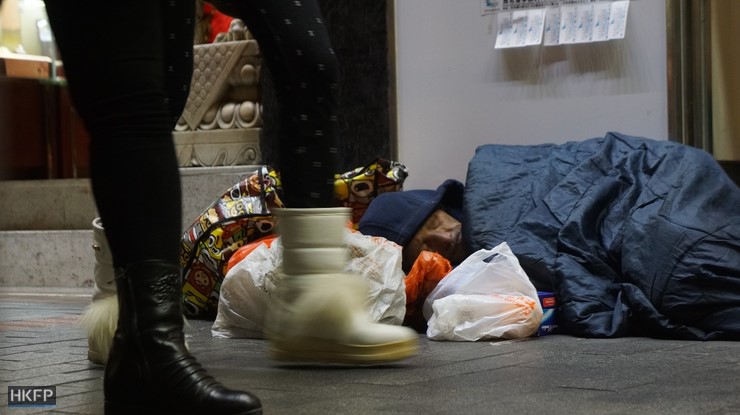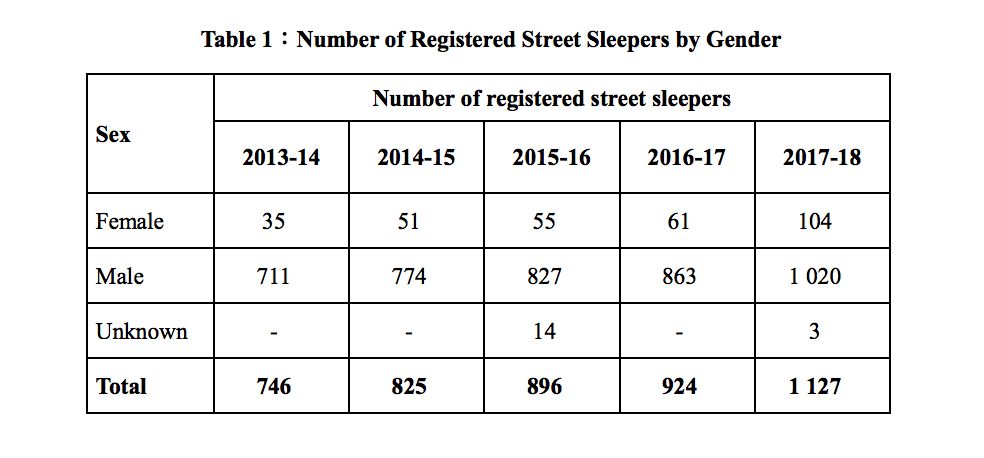The number of registered homeless people in Hong Kong continues to climb and is now over 1,000.
Secretary for Labour and Welfare Law Chi-kwong told the legislature on Wednesday that there were 1,127 street sleepers registered with the Social Welfare Department in the year 2017-18 – an increase of 51 per cent since 2013-14.

The number of female street sleepers has nearly tripled over the same five-year period, from 35 in 2013-14 to 104 over the past year.
However, the actual number of homeless people in Hong Kong may be higher. A citywide survey conducted by the City University of Hong Kong and three NGOs in 2013 identified around 1,400 homeless people. The number rose to over 1,600 in a similar survey conducted in 2015. These figures are nearly double the official ones.

The government found that over half of the registered people sleep in parks, playgrounds and car parks. Other locations include flyovers, public toilets, bus stops and 24-hour fast food restaurants.
The most commonly cited reason for homelessness is inability to pay rent owing to unemployment. Others said they could not find affordable housing or find a place to live after being discharged from prisons or other institutions. Of those registered last year, 92 people said it was a “personal choice.”
More than half of the 1,127 registered street sleepers said they had been homeless for more than five years. Of these, 244 people said they had been sleeping on the street for more than a decade.

The Social Welfare Department subsidises six NGOs that provide temporary accommodation for street sleepers. With a total capacity of 640 people, their utilization rate was about 80 per cent on average in the third quarter of 2017-18.
Law said the department has no plan to study why some street sleepers are reluctant to use these facilities, or why they return to the street after staying in the shelters. But he said the government will continue monitoring the performance of shelter operators.
There is also no plan to increase the number of shelters, the secretary said.
See more: ‘McRefugees’ urge Hong Kong gov’t to address homelessness, as NGO says issue has worsened
In a study published in March, NGO Society for Community Organization (SoCO) identified 384 homeless people who slept in 24-hour McDonald’s branches in December 2017. The number was more than six times that in 2013.
SoCO Community Organiser Ng Wai-tung told Commercial Radio on Wednesday that the number of homeless people is likely to increase in the summer, as bed bugs – a common problem in subdivided units – are more active when the weather gets warmer.

He said the upward trend of female street sleepers may be partially explained by the availability of 24-hour fast food restaurants, which provide a relatively safe environment for women to spend the night.
Ng added that, contrary to the government’s claims, there is insufficient temporary housing. He recommended that the government not only increase the number of shelters, but also extend the duration over which homeless people can stay there.
Government operations
Meanwhile, local NGOs have been urging the government to adopt a “homeless-friendly” policy. There have been instances of street sleepers being subjected to sudden clearance operations without any negotiation or communication from the government.
The government came under fire in January for attempting to clear a homeless camp at the Kwun Tong Public Pier despite the cold weather. Following public pressure, the eviction was postponed to March, though street sleepers returned on the same evening, HK01 reported at the time.
Law said the government does not keep a record of the number of inter-departmental clearance operations.
In response to the calls to address homelessness, the secretary said: “Street sleeping is a complex social problem, involving various policy bureaux and departments.”
He said different departments work together to “support street sleepers and improve their motivation for receiving support, with the hope to encourage them to quit street sleeping as soon as possible.”
